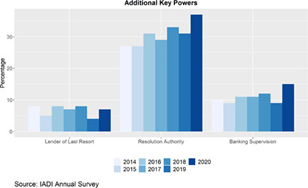↵
Paying attention to solving difficulties for businesses and people
Enterprises, in general, and SMEs, in particular, play a crucial role in the socio-economic innovation and development of the country, in which the SME sector accounts for about 97% of the total number of enterprises in operation (857,600 enterprises in operation). Under the direction of the Government, this is the group of customers that the banking industry prioritizes in credit-granting activities. Accordingly, over the past time, following the implementation of Resolution No. 35 (2016), Resolution No. 58 (2023) of the Government on supporting the development of enterprises and private enterprises, the implementation of the Law on supporting SMEs, and other Decrees, guiding the implementation of the Law on Support for SMEs, the SBV has developed action programs for the banking industry to drastically implement many solutions to improve the business environment and facilitate the development of enterprises in general and SMEs in particular.
Through the report of the Association of SMEs, responding to the opinions of businesses the Governor of the SBV, Ms. Nguyen Thi Hong, stated that in the current context, people and businesses, especially SMEs, are facing many difficulties in business. This is also a common problem globally, not only in Vietnam. Faced with this fact, the Government and the Prime Minister strongly directed solutions to solve difficulties for people and businesses, including SMEs. The Governor said that the difficulties of small and medium-sized enterprises are caused by many objective and subjective reasons, requiring many solutions from many agencies, ministries, localities, and businesses themselves. Speaking at the conference's opening, the Prime Minister also stated that this conference focused on difficulties in banking activities, and there may also be meetings with other ministries and sectors.
On the side of the SBV, the Governor said the SBV is focusing on solving difficulties for businesses and people in general and SMEs in particular. Since the Covid pandemic, the banking system has implemented many mechanisms and policies to support businesses. For example, the policy of interest reduction, interest exemption, and fee reduction with businesses in the past period amounts to a total of 60 trillion VND. This is a very large amount of the banking system's resources, showing that the banking system supports businesses, including SMEs. In addition, many solutions on interest rates, credit, debt restructuring, and debt classification retention were implemented.
Responding to the opinions of SMEs, the Governor concluded that for the banking sector, opinions revolved around two issues, namely interest rates and credit access.
Regarding interest rates, the Governor said that in the context that central banks of other countries still maintain high-interest rates and continue to increase interest rates, on the basis considering the context and situation, the SBV has reduced the operating interest rate four times, bringing the operating interest rate to the level before the Covid-19 pandemic. The Governor also emphasized that the SBV is one of the few central banks in the world which reduce interest rates. Credit institutions are also actively reducing interest rates; the average interest rate is about 1% lower than at the end of 2022; due to the policy lag, credit institutions may continue to decrease soon. The Governor also said that lowering interest rates shows the determination of the SBV because when lowering interest rates, the SBV must steer and coordinate policy tools to stabilize not only the monetary market but also the foreign exchange market, ensuring the safety of banking operations.
Concerning credit access, the Law on Credit Institutions currently stipulates that credit institutions require borrowers to provide documents proving the feasibility of the plans, projects, and financial capacity to ensure debt repayment ability and right purpose capital usage. The guiding circular of the SBV also stipulates the same. The SBV does not stipulate that loans must have collateral (credit institutions still provide unsecured loans if customers can prove their ability to repay). The SBV also does not regulate the ratio of loans over the value of the collateral and does not stipulate the documents that customers must provide to credit institutions to prove their eligibility for loans. These issues are completely regulated by the credit institution in its own internal process. Documents proving the eligibility for loans vary depending on the purpose of the loan, such as loans for real estate investment, loans to implement an export project, loans for agricultural production, etc. The SBV regularly directs credit institutions to review loan procedures, creating favorable conditions for businesses to access capital but still must ensure compliance with the provisions of the Law.
Although the lending regulations have not changed over the past time, the SBV has tried to create favorable conditions for businesses to borrow capital by promulgating Circular No. 02, allowing credit institutions to restructure the repayment period and maintaining the debt group for customers.
Understanding and sharing between banks and businesses
The Governor said that the interaction between banks and businesses is very necessary to understand, share, identify difficulties, problems, and solve them together based on compliance with the Law. Therefore, in the past, the SBV has directed its province and city branches to organize many conferences to connect banks and businesses to remove difficulties in credit and interest rates. Businesses openly discussed problems such as failure to get a loan from any bank; the bank explained why businesses couldn't get a loan, etc. In addition, there was an opinion that joint-stock commercial banks mobilized high-interest rates and should lend loans with higher interest rates; some banks mobilize in one province and lend to other provinces, but businesses cannot borrow from joint stock commercial banks. With this opinion, the Governor explained that deposit and lending interest rates are decided by credit institutions themselves; if businesses are eligible for loans but cannot borrow from Joint Stock Commercial Banks, they can still borrow from State-owned joint stock commercial banks. Currently, the whole system has more than 2,000 branches across the country. Banks are present in the district; the social policy banks also have transaction points at the commune level.
The need to synchronize many policy solutions from ministries, branches, and localities
The Governor said that, at present, there is a separate Law on supporting SMEs and five Decrees guiding the Law. But it is the enforcement of these policies that matters. On the banking side, to support SMEs, the SBV has set a ceiling on short-term lending interest rates for priority sectors, including SMEs. The SBV has issued a circular providing guidance on lending based on value chains, and lending to agricultural enterprises applying high technology. However, the difficulties of SMEs need to be fully identified and evaluated to set the correct and successful solutions. Therefore, the Governor suggested that the Government organize a conference to evaluate the overall implementation of SME support policies in accordance with the Law on supporting SMEs to effectively solve the problems. Accordingly, the Governor requested that each ministry, branch, and locality need to give solutions and policies to jointly solve difficulties for SMEs, that no single industry or policy can solve all problems.
Among the support solutions, the Governor emphasized, enhancing the operational efficiency of local credit guarantee funds is very important because the locality has the best understanding of business operations in the area. If resources are devoted to guaranteeing loans for SMEs, the Governor believes that credit growth will be higher and SMEs will be more supported.
In order to increase access to capital for businesses, the Governor said that SMEs themselves also need to overcome their limitations because they are obstacles that hinder banks from making lending decisions. Therefore, SMEs need to improve their corporate governance, financial standing, and information transparency... Currently, businesses are having problems with their output. Over the past time, the Prime Minister has strongly directed ministries and branches to promote trade. Still, businesses need to pay more attention to the quality of goods and services. When goods have geographical indications, clear origin, and ensure food safety requirements..., customers will be motivated to buy.
On the side of the SBV, the Governor affirmed the SBV would continue to closely follow the direction of the Government and economic and monetary developments, actively implement solutions of the banking sector as well as coordinate with ministries and agencies to support to actively remove difficulties for businesses, people in general and SMEs in particular.
According to the SBV, as of the end of June 2023, the economy's outstanding loans reached VND 12,423 million billion, an increase of 4.73% compared to 2022. Outstanding business loans were about VND 6.3 million billion (up 4.66% compared to 2022, accounting for 51% of the economy's outstanding loans). Outstanding loans for SMEs reached nearly VND 2.3 million billion, an increase of almost 4% compared to the end of 2022, accounting for about 18.5% of the economy's outstanding loans. Currently, most credit institutions lend to SMEs; many have actively implemented preferential credit programs and products with loan conditions and interest rates lower than conventional ones.



























